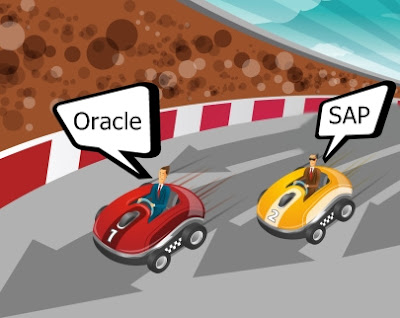I’m in the middle of reviewing the best and most used enterprise resource planning (ERP) systems. Almost all articles lead to two contenders: SAP and Oracle. While they may have different target users/markets and technical maturities, comparing them cannot be helped. Here’s to share my understanding on what Oracle has and SAP doesn’t:
3 Big Things Oracle Has that SAP Doesn’t
1. Easier customization
Accommodating ever-changing business needs, Oracle provides flexibility and easy customization of the ERP modules (e.g. PeopleSoft and the e-business suite), while SAP is tightened with difficulty in adjusting the core processes and requirements of customers.
For companies having core competencies relying on their adaptability working with external pressures, Oracle is better recommended. For those which can accept less changes in the packaged system, SAP is likely found to be acceptable. The downside of SAP is that companies will be forced to adhere to how the SAP software works. Organization culture will be impacted and their standardized processes will be changed. Resistance must be expected and embraced.
2. Lower costs
Related to the first point: Because customization management affecting core functions is more efficient in Oracle, modules can be further tailored to suit the current processes of a system. In effect, training the users on how to use the ERP system upon deployment incurs lower costs and less time. In contrast, SAP has more complex features and functions that may be good for larger companies to utilize, but they must know just how to learn and manage training the users effectively on its complexities.
In terms of license fees, their prices are comparable but SAP demands higher consulting and resourcing costs. This might be because organizations, projects and teams using SAP are generally bigger in size. In the ERP world, SAP is looked up to as a high-end brand. Expensive to buy and difficult to customize and maintain, we can identify it like the Ferrari. On the other hand, Oracle can be deemed as the Mercedes Benz, a relatively less expensive brand having a broad variety of products with strong, underlying technology.
3. More product innovation
Oracle offers more innovation and invention in its technology direction (product road map), but this may also constitute to a negative inkling — that users/customers will feel uncertain towards acquiring their product lines at once. (They might want to see the latest release of patches or versions before deciding for final acquisition.) Quite the opposite, SAP today is seen as an innovation-free ERP company as it’s a very established one, indeed.
Conclusion
Both Oracle and SAP have their own strengths, weaknesses and tradeoffs. It’s hard to say which one is better because the selection of the “right fit” depends really on the requirement, priority levels and competitive advantages companies (regardless of industry) are aiming for.


Leave a Reply